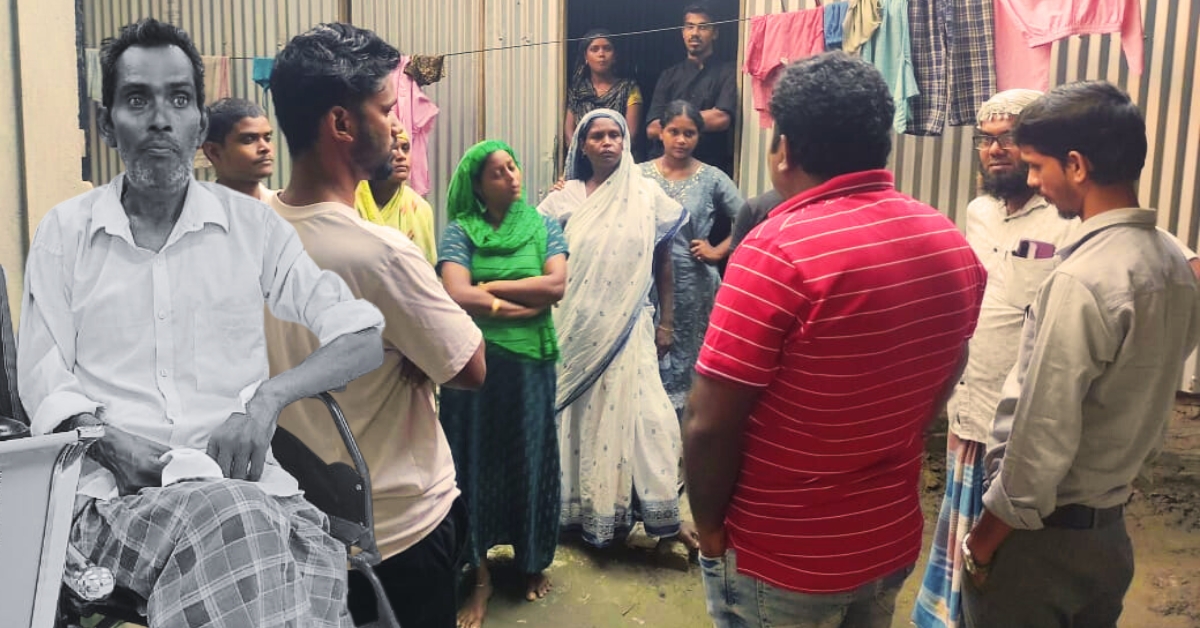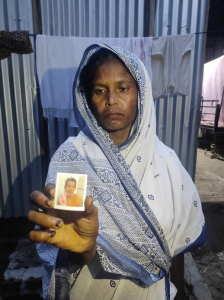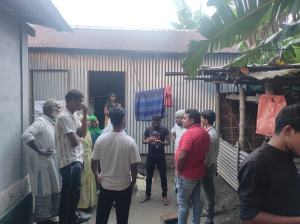
The life and death of Amzad Ali: Declared foreigner, buried Indian Despite documented citizenship and appeals for medical care, Amzad Ali dies in custody; authorities return his body after two days for burial in his village
19, Sep 2025 | CJP Team
Branded a “foreigner” in life, yet laid to rest in his own Assamese soil after death — the story of 49-year-old Amzad Ali captures the cruel paradox that thousands of Bengali-speaking Muslims endure in Assam today. Denied dignity and recognition in life, he found belonging only in death.
The final days
On September 14, 2025, Amzad succumbed to cancer at the State Cancer Institute, Guwahati. Just four months earlier, on May 28, 2025, he had been detained and confined in the Matia detention camp, Goalpara. His health rapidly deteriorated inside confinement, but despite medical advice recommending palliative care outside, he remained in custody until his last breath.
The Gauhati High Court was due to hear his pending case, WP(C) 5297/2025, on September 15, 2025 — just a day after his death.
A villager turned “D-Voter”
Amzad was a resident of Rowmari Pathar, a village on the banks of the Brahmaputra in Barpeta district. In 1997, his name was marked as a “D-voter” in the electoral rolls of Chenga constituency. His wife, Maymala Begum, and his mother were similarly marked.
Poverty and illiteracy meant that Amzad could not afford to fight the label. “Our family’s legacy is recorded since the 1951 NRC. His father, Hajo Sekh, and forefathers were registered voters even in 1966,” said Abdul Jalil, Amzad’s cousin.
The Tribunal’s verdict
In 2017, Amzad’s case was referred to the 7th Foreigner Tribunal, Barpeta (Case No. 998/17). He appeared through years of hearings, even during the pandemic. On December 9, 2022, the Tribunal declared him a “foreigner.”
But the family says they were never informed. “Our lawyer kept telling us there were just two more hearings left. We didn’t even know the judgment had already come,” recalled Maymala.
Unaware of the decision, Amzad continued his work as a daily wager — until police abruptly detained him in May 2025.
Fear and helplessness
Amzad and Maymala have seven children — three sons and four daughters. Yet in his final months, his wife dared not visit him in detention or hospital. Branded a “D-voter” herself, with her case still pending in the High Court, she lived in constant dread of being seized too.

Maymala hold up a tiny photo of Amzad
“What if I was also caught and locked in Goalpara Camp?” she asked, torn between grief and fear. Despite her parents’ names being recorded in the 1951, 1971 and 2019 NRCs, she alone was excluded.
Ignored appeals
Amzad’s condition worsened after his cancer diagnosis on August 11, 2025. The Superintendent of the detention camp even advised the family to seek his release for treatment. Jalil, his cousin, wrote a formal plea to the Goalpara Deputy Commissioner on September 1, 2025, requesting that Amzad be freed for medical care.
But no response ever came. Instead, officials summoned the gaon bura (village headman) to inform the family that Amzad’s health was failing. By the time they reached Guwahati Medical College, it was too late.
Doctors’ reports clearly stated that “no treatment modality was left” and only palliative chemotherapy was possible — yet the authorities refused to act.
The final farewell
After two days of official formalities, on September 16, 2025, Amzad’s body was handed over to his family. That evening, he was buried in Rowmari Pathar, just 1.5 km from where he had been detained months earlier.
He was buried as an Indian, in the very soil that had disowned him. His two sons working as migrant labourers in Chennai could not even return to attend the funeral.
A cry for justice

Assam CJP Team visits the grieving family at their home
A delegation from Citizens for Justice and Peace (CJP), including state in-charge Nanda Ghosh, advocate Abhijeet Choudhury, DVM of Barpeta Jafar Ali, and local volunteers, visited the grieving family. Jalil showed them the unanswered letter he had sent to the Deputy Commissioner.
“I begged the authorities to release him for treatment. But they kept him locked up until he died. And then, they gave us his body,” Jalil told them.
The cruel paradox
Amzad Ali’s story is not just a personal tragedy; it reflects a wider, systemic cruelty. For decades, thousands have lived under the burden of being branded “doubtful” or “foreigners.” Amzad lived that stigma, died in custody, and was finally buried in the land he always called home.
A citizen in life, denied recognition by the state. A foreigner in papers, but an Indian in death.
Amzad’s death is the second in Matia detention camp this year. On April 17, 2025, Abdul Matleb also died under similar circumstances. Both men were declared “foreigners” during their lifetime, only to be buried in their native villages in Assam.
The story of Abdul Matleb may be read here.
Separate report on Ali’s death may be read here.
Related:
From Detention to Deportation: The mass deportations and detention crisis at Assam’s Matia centre
SC: Only 10 deported, 33 of 63 contest foreigner status from the Matia Transit Camp, Assam
Victory in Dhubri FT: Jarina Bibi declared Indian after years of ordeal










